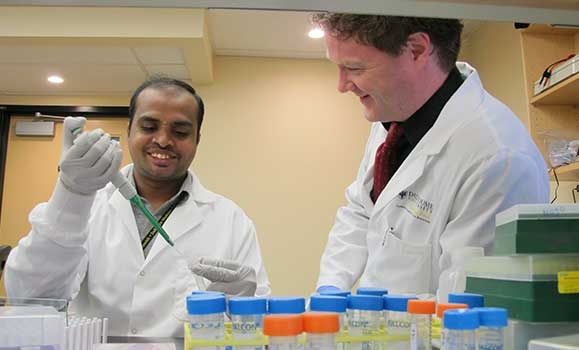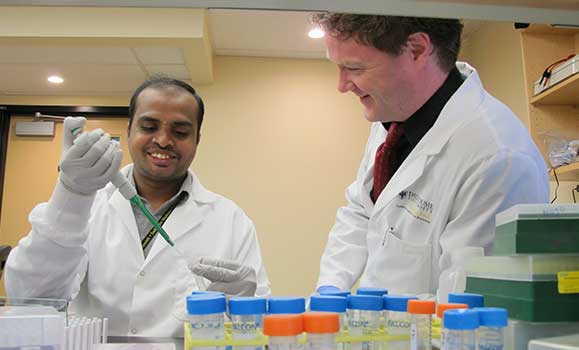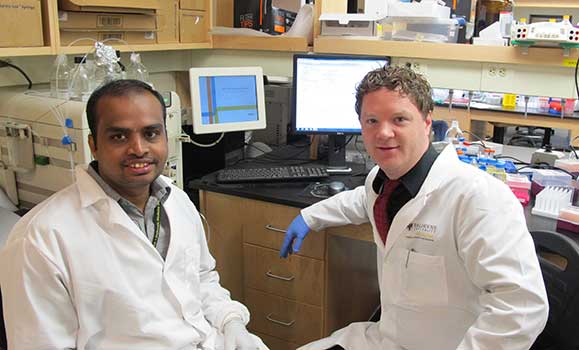Media Releases
» Go to news mainDal researcher invents chemo delivery system that minimizes impact on healthy cells

A researcher at Dalhousie Medical School has developed a new way to deliver chemotherapy drugs. Using nanotechnology, the novel system releases chemo in cancerous cells only, leaving healthy cells alone. The work was recently published in Nature’s Scientific Reports.
Dr. Naga Puvvada, a postdoctoral fellow at Dalhousie Medicine New Brunswick (DMNB), created the drug delivery system. He worked in collaboration with DMNB’s Dr. Keith Brunt and researchers in the United States and India.
The research team designed a nano-particle that increases the amount of chemotherapy delivered to a tumour, and releases chemo only once inside tumour cells. This minimizes the impact on healthy tissue.
Only with the high level of acidity created by tumours does the nano-particle become activated – it then enters the cancerous cell and breaks open. As the nano-particle releases its chemotherapy, it undergoes a colour change, known as photo-switching. This photo-switching enables researchers to determine how much of the chemo has been released and can be used to identify the presence of tumours.
“What ‘s unique about our design is the potential clinical translatability of our fluorescent photo-switching, as it could help determine the amount of chemotherapy being released,” says Dr. Puvvada. “We still have some work to do before this is used in the clinic as the fluorescence is not currently picked up by MRIs or CTs. This is one of the next steps in our research.”
While the research was based on human breast cancer cells, it has the potential to be applied to any solid tumour.
“This new delivery system, while it is in its early stages, is promising for patient-tailored therapy in personalized medicine,” says Dr. Brunt, assistant professor in the Department of Pharmacology. “The potential to improve the quality of life for solid tumour cancer patients and their overall outcomes is within reach with this type of targeted, measurable treatment.”
The research was funded by the New Brunswick Health Research Foundation, the Reynolds Fellowship, and the Canadian Natural and Engineering Research Council.
-30-
For more information:
View Novel ZnO hollow-nanocarriers containing paclitaxel targeting folate-receptors in a malignant pH-microenvironment for effective monitoring and promoting breast tumor regression at nature.com/scientificreports.
Images
 |
Dr. Naga Puvvada (left), a postdoctoral fellow at Dalhousie Medicine New Brunswick (DMNB) and DMNB’s Dr. Keith Brunt (right). July 2015 |
 |
Dr. Naga Puvvada (left) and Dr. Keith Brunt (right). July 2015 |
Media Contact
Allison Gerrard
Dalhousie Medical School
1 (902) 222-1917
allison.gerrard@dal.ca
Comments
comments powered by Disqus
Recent News
- Media release: Nova Scotia pharmacists among Canada’s first to prescribe HIV prevention drug with help from Dalhousie pilot study
- Media opportunity: What do you need to make a hit song? Math, according to a Dalhousie University mathematician who created a pop song using fractals, the cantor set and all things mathy
- Media opportunity: Uncovering the link between meltwater and groundwater in mountain regions is a priority for sustainable water management: international research paper
- Media opportunity: Fish biomass faces steep declines by end of century under high‑emissions scenario: FAO report by Dalhousie University, international scientists
- Media Release: Two Dalhousie students selected as McCall MacBain International Fellows
- Media release: Barriers to care ‑ research reveals the experiences of transgender and gender‑diverse people seeking health care
- Media opportunity: Being involved in extracurricular activities really does matter when it comes to 'mattering': Dalhousie University research
- Media opportunity: Podcast by Dalhousie researcher and Halifax photographer looks at barriers to Nova Scotia's coastline, decreasing access to waterfronts and problems with litter, marine debris in public coastal areas
